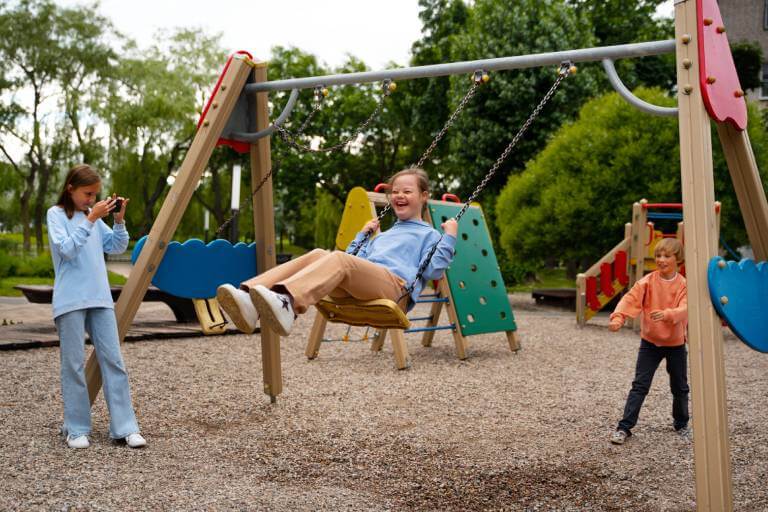In the digital age, children are spending more time indoors than ever, often obsessed with screens for entertainment and education. While technology has its benefits, there’s no substitute for outdoor play. Encouraging children to spend time outside is not only fun but also essential to their overall development. From improving physical health to fostering creativity, outdoor play offers countless benefits every parent should be aware of.
Why Is Outdoor Play Important?
Playing outdoors is more than just a way to burn off energy. It’s a necessary part of a child’s development. Children who play outdoors regularly gain skills and experiences that help them in school, socially, and even emotionally. Here are some key reasons why outdoor play is essential:
Physical Health Benefits
Spending time outdoors keeps children active, which is essential for their physical growth. Activities like running, climbing, and playing sports improve cardiovascular health, strengthen muscles, and develop motor skills. Outdoor play also exposes children to sunlight, a natural source of vitamin D, which is essential for bone growth and the immune system.
According to the American Academy of Pediatrics, children who play outdoors regularly have better overall health and a lower risk of obesity.
Mental and Emotional Development
Outdoor play stimulates mental health in unique ways. Activities like building forts, exploring nature, or playing imaginative games improve cognitive skills, problem-solving, and creativity. Additionally, being outdoors reduces stress and anxiety, helping children develop greater emotional resilience. Studies even show that children who regularly play outdoors tend to be in a better mood and have higher self-esteem.
Social Skills and Teamwork
When children play outside with their peers, they learn essential social skills. Sharing, negotiating, taking turns, and collaborating are all integral parts of group play. These interactions help children develop empathy, communication skills, and conflict resolution skills, which are essential for lifelong success.
Types of Outdoor Play to Encourage
Not all outdoor play is created equal, and offering a variety of activities can benefit children in many ways. Here are some practical ideas:
Active Play
Encourage children to engage in activities that get their heart pumping, such as cycling, swimming, soccer, or tag. Active play improves fitness, coordination, and energy levels while teaching them to set goals and push themselves.
Exploratory Play
Take your children on a nature walk, treasure hunt, or gardening trip. Exploratory play stimulates curiosity, observation, and environmental awareness. Children learn to ask questions, notice details, and connect with the natural world around them.
Creative Play
Provide opportunities for children to express their imaginations outdoors. Building forts, drawing with chalk, or planning an imaginary adventure stimulates creativity and problem-solving skills. Creative outdoor play allows children to experiment freely, express themselves, and develop original ideas.
Relaxed Play
Sometimes, playing outside doesn’t need to be structured. Let children relax under a tree, read a book in the garden, or enjoy a picnic. Relaxing moments outdoors promote mindfulness, introspection, and a love of nature.
5 Tips to Make Outdoor Play a Habit
Getting kids outside can be difficult in a world full of screens, but there are strategies to make outdoor play a regular part of their routine:
- Set a Schedule: Dedicate at least 30-60 minutes daily for outdoor activities.
- Make it Fun: Use games, challenges, and interactive toys to keep children engaged.
- Join Them: Participate in outdoor activities with your kids. Your involvement makes the experience more exciting.
- Explore Your Community: Visit parks, playgrounds, and nature trails to provide variety and adventure.
- Limit Screen Time: Encourage outdoor play by reducing indoor screen-based entertainment.
Safety Considerations for Outdoor Play
While playing outdoors has many benefits, safety should always be a priority. Here are some essential tips:
- Make sure children wear appropriate clothing and sunscreen.
- Supervise young children while they play.
- Check playgrounds or outdoor areas for hazards.
- Teach children basic safety rules for outdoor activities, including road safety and being alert to strangers.
Conclusion
Investing time in outdoor play is an investment in your child’s future. Beyond physical fitness, it builds self-confidence, social skills, creativity, and resilience. Encouraging children to play outside every day helps them grow into healthy, happy, and fulfilled individuals.
Start small, make it fun, and watch your child thrive. Outdoor play isn’t just a hobby—it’s an essential part of raising strong, capable children.
Ready to help your children fully enjoy the outdoors and reach their full potential? Discover more tips, activities, and resources for healthy child development on Dr. Olfa Koobar. Make outdoor play a part of your family’s daily routine today!




